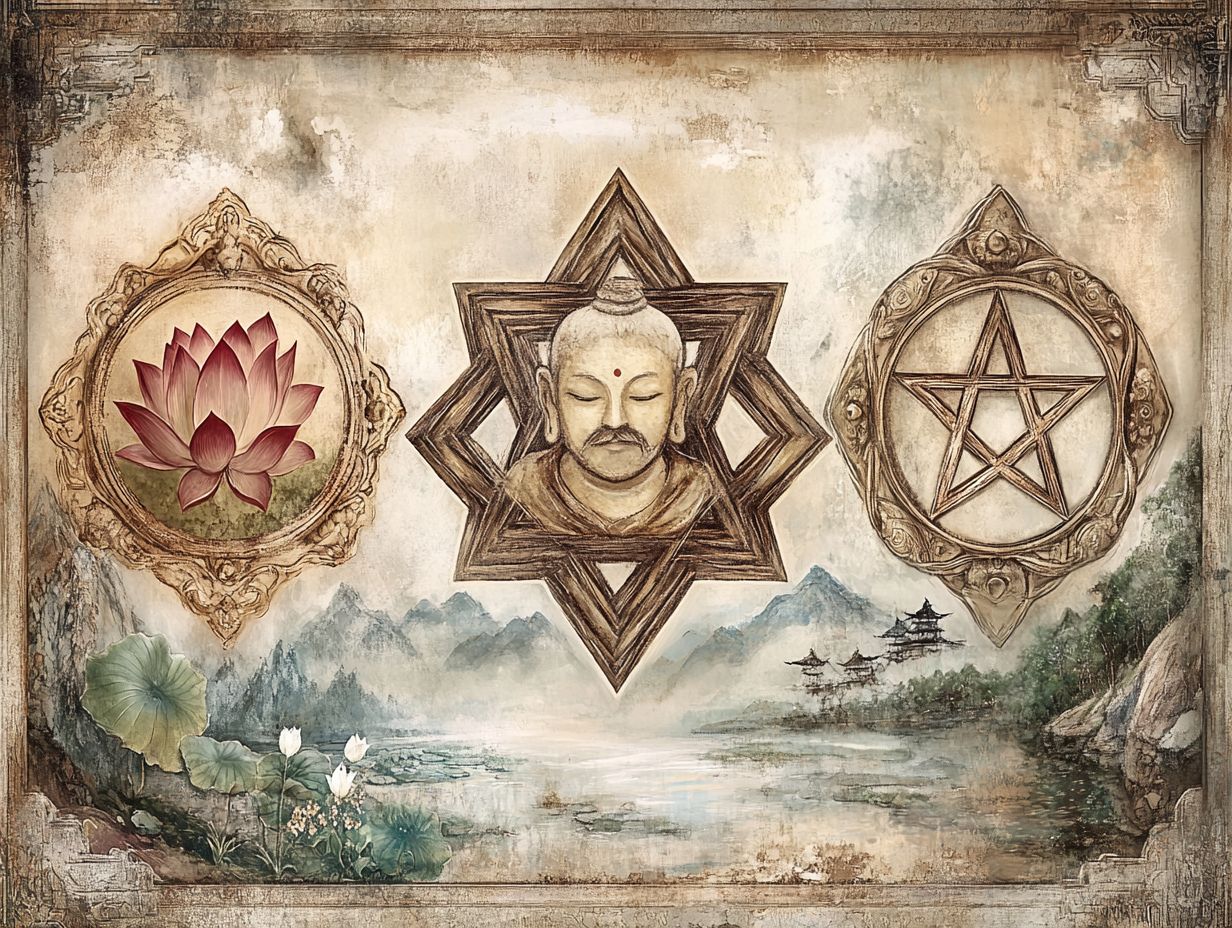What Do Confucianism, Hinduism, and Judaism Have in Common?
Confucianism, Hinduism, and Judaism stand as three profound belief systems that have significantly influenced cultures and societies worldwide. Each of these global religions presents a distinct perspective on morality, ethics, and life practices, while simultaneously unveiling intriguing similarities and differences among them.
This exploration delves into the core beliefs, fundamental teachings, and key rituals of these religions. By examining their views on morality, ethics, and spiritual practices, readers can uncover insights into their shared values and unique characteristics, thereby deepening their understanding of these influential traditions.
What are the Core Beliefs of Confucianism, Hinduism, and Judaism?

The fundamental tenets of Confucianism, Hinduism, and Judaism weave together a rich tapestry of ethics, morality, spirituality, and religious practices that profoundly influence the worldviews of billions worldwide.
Confucianism places a strong emphasis on social harmony, ancestor worship, and the veneration of elders, while Hinduism extols the significance of Dharma, karma, and the quest for enlightenment.
Meanwhile, Judaism, centered around the teachings of the Torah and the moral principles derived from divine authority, offers a comprehensive framework for ethical living, communal responsibilities, and religious observances.
Collectively, these religions cultivate a shared memory and a commitment to virtues that transcend cultural boundaries, ultimately fostering spiritual growth and interfaith dialogue.
What are the Main Teachings of Confucianism?
The core teachings of Confucianism center on essential principles such as humaneness, reverence for elders, and the significance of social harmony. This philosophy advocates for the cultivation of virtues that promote integrity, justice, and a well-structured society.
By stressing the importance of moral conduct and ethical behavior, Confucianism encourages individuals to reflect on their actions and their broader impact on the community. This perspective instills a sense of responsibility and moral duty, prompting members of society to engage actively in the welfare of their communities.
The teachings, preserved in various Confucian texts, serve as enduring guides for both personal growth and collective well-being. Through the study of these works, followers gain profound insights into nurturing harmonious relationships and fostering respect among peers, ultimately aiding in the creation of a more cohesive and empathetic society based on shared moral values.
The application of these principles is evident in everyday interactions, as individuals endeavor to embody the values that enrich and enhance their communities.
What are the Fundamental Beliefs of Hinduism?
The fundamental beliefs of Hinduism are intricately woven into the concepts of Dharma, spirituality, and the profound cycle of life and afterlife. Adherents of Hinduism embrace a diverse array of philosophies and practices that highlight the interconnectedness of all beings, pursuing enlightenment through meditation practices and ritualistic observances.
At the heart of these teachings lies the significance of communal worship, where devotees congregate to honor deities and partake in vibrant religious festivals. This collective reverence fosters a sense of belonging and shared spirituality among participants. Additionally, family traditions hold immense value, as teachings are transmitted through generations, allowing individuals to connect with their cultural heritage while adhering to sacred scriptures that guide moral and ethical conduct.
This rich tapestry of beliefs not only nurtures personal growth but also fortifies community bonds, rendering Hinduism a dynamic and evolving faith that thrives on the enduring principles of love, respect, and understanding. Additionally, the practice of pilgrimage to sacred sites plays a crucial role in the spiritual lives of many adherents.
What are the Basic Tenets of Judaism?
The fundamental principles of Judaism are intricately woven around the sacred teachings of the Torah, which impart essential guidance on moral conduct, justice, and the dynamics of community life. Jewish beliefs place great emphasis on adhering to religious laws and participating in rituals that promote spiritual development and foster a robust communal identity. The ethical teachings of Judaism are further enriched by the wisdom of religious leaders who interpret these sacred texts.
At the heart of these practices lies the observance of the Sabbath, a day dedicated to rest and reflection, serving as a profound reminder of creation and the covenant established between the Jewish people and God. Festivals such as Passover and Yom Kippur further enrich this spiritual tapestry, providing opportunities for celebration and atonement, respectively.
Rites of passage, notably the Bar and Bat Mitzvahs, signify the transition of individuals into adulthood within the community, reinforcing the ideals of personal responsibility alongside shared values. Ethical teachings grounded in compassion and justice guide daily interactions, while religious leaders play a crucial role in interpreting these teachings and upholding traditions, thereby nurturing a vibrant Jewish identity for generations to come.
How do Confucianism, Hinduism, and Judaism View Morality and Ethics?
Confucianism, Hinduism, and Judaism each offer distinct perspectives on morality and ethics, thoughtfully engaging with the intricacies of human nature, social responsibility, and moral philosophy.
Confucianism champions virtue ethics and moral conduct that fosters social harmony, encouraging individuals to act in ways that benefit the community. In contrast, Hinduism underscores the significance of Dharma as a guiding principle for ethical living, emphasizing the alignment of one’s actions with cosmic order and the nature of reality.
Meanwhile, the ethical teachings of Judaism, deeply rooted in the Torah, illuminate the paramount values of justice, righteousness, and the essential nature of communal obligations, illustrating a holistic approach to moral responsibility that extends to social justice.
What are the Moral Principles in Confucianism?

Moral principles in Confucianism are primarily anchored in the concepts of humaneness and respect for elders, which form the foundation for ethical conduct within social relationships. Confucian ethics advocate for virtues such as compassion, righteousness, and loyalty, all aimed at fostering a harmonious society.
These foundational tenets highlight the significance of virtue ethics, urging individuals to cultivate a moral character that transcends personal ambition and embraces communal well-being. By nurturing qualities such as benevolence and integrity, adherents can make meaningful contributions to their communities, thereby reinforcing the social fabric and promoting social harmony.
In the realm of Confucian thought, the family unit is viewed as a microcosm of society, where personal development is intricately linked to the fulfillment of one’s roles and responsibilities. This perspective positions personal growth as a vital component of societal stability, creating a reciprocal relationship that enhances both individual and collective flourishing.
How Does Hinduism Define Morality and Ethics?
Hinduism articulates its understanding of morality and ethics through the concept of Dharma, which embodies the principles of righteous living and duty. This framework serves as a guiding light for individuals seeking spiritual growth while remaining attuned to societal values and the interconnectedness of all life. Meditation practices and communal worship are integral to this spiritual journey.
By embracing Dharma, practitioners adeptly navigate the intricate moral dilemmas that emerge within their personal and communal spheres. It underscores the significance of harmonizing spiritual practices with familial values and communal responsibilities, ensuring that one s actions transcend mere self-interest and uphold the welfare of others.
When confronted with ethical challenges, individuals are urged to engage in profound reflection regarding their obligations to their families, communities, and the universe as a whole. This comprehensive approach cultivates a sense of accountability and compassion, reinforcing the notion that each decision plays a vital role in promoting the greater good and sustaining harmony within society.
What are the Ethical Standards in Judaism?
The ethical standards in Judaism are firmly rooted in the teachings of the Torah, which underscores the principles of justice, compassion, and the moral obligation of individuals to act ethically within their communities. These standards serve as a guiding framework for Jews in their daily interactions and decision-making processes, addressing existential questions about human behavior and moral responsibility.
In contemporary society, these principles find expression through various avenues, such as philanthropy, social justice initiatives, and active involvement in community service. Jewish individuals frequently engage in advocacy for marginalized groups, demonstrating a profound commitment to tikkun olam, or the concept of repairing the world, through their actions. Religious tolerance and interfaith dialogue are also essential components of these efforts.
By adhering to the values enshrined in religious law, they not only nurture a sense of communal identity but also make meaningful contributions to the broader society. This active engagement exemplifies how ancient teachings can inspire modern efforts to tackle pressing ethical dilemmas, reinforcing the notion that ethical living is a collective responsibility that transcends individual pursuits. The Golden Rule, a universal truth across many faiths, also finds resonance in these ethical frameworks.
What are the Practices and Rituals of Confucianism, Hinduism, and Judaism?
The practices and rituals of these religions are deeply rooted in their historical context and cultural influence, illustrating the rich tapestry of human spirituality and communal life. Each tradition offers a unique approach to worship, community rituals, and ethical conduct, underscoring the diversity of religious experiences across the globe.
The practices and rituals of Confucianism, Hinduism, and Judaism play a pivotal role in the spiritual lives of their adherents, intricately fostering a sense of community, family values, and connection to the divine.
Confucian rituals highlight the significance of ancestor veneration and the pursuit of communal harmony, embodying the values of respect, family values, and filial piety.
In contrast, Hindu practices showcase a vibrant tapestry of festivals, rites, and meditation practices, celebrating the richness of life and spirituality.
Meanwhile, Judaism, with its deeply entrenched traditions, emphasizes sacred ceremonies and communal worship, reinforcing the bonds that unite its believers in shared faith, purpose, and moral duty.
What are the Key Rituals in Confucianism and Their Philosophical Significance?
Key rituals in Confucianism encompass ancestor worship and ceremonies that honor familial relationships, embodying the fundamental values of respect for elders and community cohesion. These practices are instrumental in reinforcing social harmony, moral values, and nurturing a collective memory.
For example, the act of ancestor veneration, which frequently includes offerings of food and incense at family altars, serves not merely as a tribute to the family lineage but also cultivates a profound sense of gratitude, respect for elders, and responsibility among descendants.
Historically, these ceremonies are deeply rooted in ancient Chinese society, where loyalty to family and obedience were of utmost importance. In contemporary contexts, such traditions continue to resonate, enabling adherents to foster robust interpersonal relationships while reinforcing vital values such as filial piety and loyalty.
Through participation in these rituals, individuals are afforded the opportunity to connect more deeply with their heritage and cultural influence, thereby promoting an atmosphere of mutual respect within their communities.
What are the Major Practices and Philosophical Concepts in Hinduism?

Major practices in Hinduism encompass a rich tapestry of rituals, meditation, and festivals, all designed to celebrate the divine and promote spiritual growth. These practices illustrate the remarkable diversity of beliefs within Hinduism, offering individuals various pathways to connect with their spirituality and dharma.
Among these practices, rituals such as puja emerge as essential expressions of devotion, allowing devotees to honor deities and seek blessings for their well-being. Yoga, a profound discipline, stands out for its ability to promote physical health and mental clarity, reinforcing the deep interconnectedness of mind, body, and spirit. Additionally, meditation practices are integral for achieving inner peace and enlightenment.
Significant festivals like Diwali and Holi not only commemorate important religious occasions but also strengthen communal identity, uniting people in joyous celebration. These events foster deeper connections within communities, encouraging individuals to embrace the collective spirit of unity and shared beliefs that thrive within Hindu culture. The philosophy of karma and dharma is also celebrated during these festivals.
What are the Important Rituals and Ethical Teachings in Judaism?
Important rituals in Judaism, deeply rooted in the teachings of the Torah, encompass a diverse array of festivals and rites of passage that mark significant life events and communal celebrations. These rituals play a pivotal role in strengthening the faith, moral values, and identity of Jewish individuals and communities.
Among these, Shabbat, the weekly day of rest, invites adherents to step away from their daily routines. This sacred time encourages prayer and reflection, allowing for the renewal of spiritual connections. Similarly, the Bar and Bat Mitzvah ceremonies mark the coming of age for Jewish youth, transitioning them into a community defined by responsibility and the observance of mitzvot. These rituals symbolize the importance of justice, compassion, and the teachings of respect.
Passover stands out as a revered festival that commemorates the Exodus from Egypt, highlighting profound themes of freedom and divine redemption. The intricate rituals associated with this festival, particularly the Seder meal, not only foster familial bonds but also promote communal worship and reflection on historical context.
Each of these practices is imbued with rich symbolic meanings, reinforcing the values and traditions that unite the Jewish community and underscore the moral foundation of Jewish life.
What are the Similarities and Differences among Confucianism, Hinduism, and Judaism in Terms of Religious Practices and Beliefs?
Confucianism, Hinduism, and Judaism embody a rich tapestry of similarities and differences, each reflecting its distinct cultural heritage and shared core beliefs. All three traditions place a strong emphasis on ethical living, communal values, and reverence for tradition. Their religious texts and teachings provide ethical frameworks that guide moral behavior and social harmony.
However, their interpretations of spirituality, concepts of divine authority, and the nature of rituals diverge notably, showcasing the unique pathways each tradition carves in the pursuit of meaning and moral development. The philosophical inquiries within these traditions address existential questions and offer guidance on the nature of reality and metaphysics.
How are Confucianism, Hinduism, and Judaism Similar in Their Ethical Teachings and Community Values?
Confucianism, Hinduism, and Judaism reveal several profound similarities, especially in their unwavering emphasis on ethics, community, and family values. Each of these venerable traditions advocates for personal development through moral conduct, reverence for elders, and the pursuit of social harmony. Their religious observances and community rituals play a vital role in maintaining these values.
These belief systems underline the critical importance of moral behavior, encouraging their adherents to cultivate virtues that benefit not only themselves but also their communities. Educational teachings within these traditions consistently highlight the necessity of imparting values to younger generations, fostering a robust sense of responsibility toward family and society at large. These values are often encapsulated in their sacred texts and religious symbols.
The ethical frameworks inherent in these religions promote values such as compassion, justice, and integrity, guiding followers in their daily interactions. This shared commitment to nurturing a cohesive community resonates throughout their teachings, reinforcing the notion that personal growth is intrinsically tied to one’s contributions to the well-being of others. The principle of the Golden Rule is a common thread that runs through their ethical teachings.
What Sets Confucianism, Hinduism, and Judaism Apart in Their Philosophical and Religious Contexts?
Despite their shared characteristics, Confucianism, Hinduism, and Judaism each present a unique landscape defined by their distinct religious practices, beliefs about divine authority, and overarching worldviews. Each tradition articulates particular philosophical concepts and interpretations of life’s purpose, profoundly influencing the perspectives of their adherents. Their religious laws and scriptures guide their moral philosophy and ethical conduct.
Confucianism, for example, places a significant emphasis on social harmony and moral integrity, expressed through rituals that reinforce familial and societal connections. In contrast, Hinduism unfolds a vibrant tapestry of deities and spiritual journeys, inviting personal exploration and devotion to one s dharma and karma. Meanwhile, Judaism focuses on the covenant between God and the people, underscoring ethical monotheism and communal life as fundamental components.
Each faith not only imparts spiritual guidance but also offers ethical teachings that resonate with their unique cultural contexts, illuminating pathways toward personal fulfillment and communal responsibility. The virtues of justice, compassion, and social justice are central to their teachings and practices.
Frequently Asked Questions

What Do Confucianism, Hinduism, and Judaism Have in Common?
All three religions have a strong emphasis on moral and ethical principles and share common beliefs in promoting ethical conduct.
How do Confucianism, Hinduism, and Judaism view the concept of God?
All three religions believe in the existence of a higher power or divine authority, but have different interpretations and beliefs about the nature of God.
Do Confucianism, Hinduism, and Judaism have sacred texts?
Yes, all three religions have sacred texts or religious scriptures that serve as guides for their followers in terms of beliefs, values, and practices.
In what ways do Confucianism, Hinduism, and Judaism promote social harmony?
These religions emphasize the importance of living in harmony with others, following social norms, and the principles of social justice and responsibilities.
Are there any similarities in rituals and practices among Confucianism, Hinduism, and Judaism?
Yes, all three religions have rituals and practices that are meant to promote spiritual growth, purify the mind and body, and connect with the divine. These practices include meditation, prayer, and community service.
What role do family and community play in Confucianism, Hinduism, and Judaism?
All three religions emphasize the importance of family and community values, such as respect for elders and caring for one’s community, in leading a virtuous life. They also highlight the significance of interfaith dialogue and cultural exchange in promoting religious tolerance.
